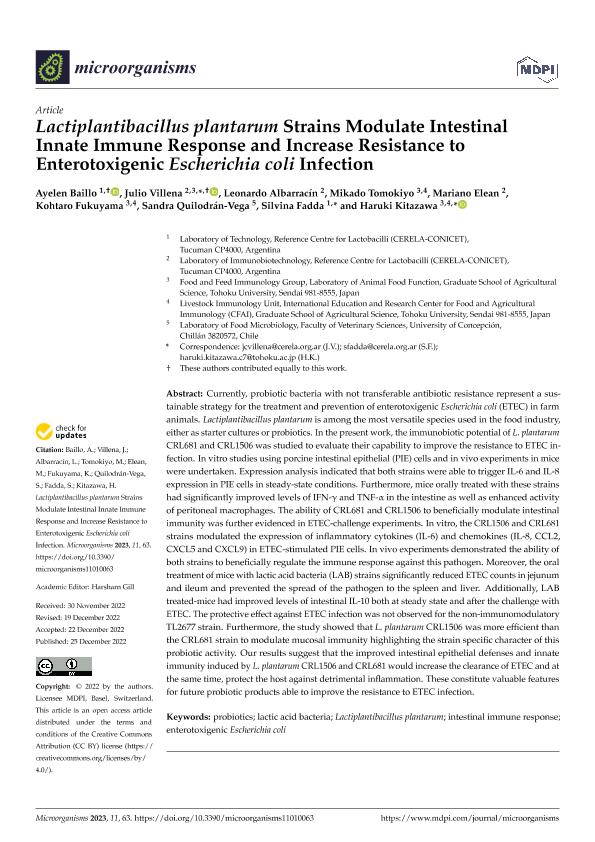Mostrar el registro sencillo del ítem
dc.contributor.author
Baillo, Ayelen Antonella

dc.contributor.author
Villena, Julio Cesar

dc.contributor.author
Albarracín, Leonardo Miguel

dc.contributor.author
Tomokiyo, Mikado
dc.contributor.author
Elean, Mariano Daniel

dc.contributor.author
Fukuyama, Kohtaro
dc.contributor.author
Quilodrán Vega, Sandra

dc.contributor.author
Fadda, Silvina G.

dc.contributor.author
Kitazawa, Haruki

dc.date.available
2023-10-17T17:43:16Z
dc.date.issued
2023-01
dc.identifier.citation
Baillo, Ayelen Antonella; Villena, Julio Cesar; Albarracín, Leonardo Miguel; Tomokiyo, Mikado; Elean, Mariano Daniel; et al.; Lactiplantibacillus plantarum Strains Modulate Intestinal Innate Immune Response and Increase Resistance to Enterotoxigenic Escherichia coli Infection; Multidisciplinary Digital Publishing Institute; Microorganisms; 11; 1; 1-2023; 1-17
dc.identifier.uri
http://hdl.handle.net/11336/215217
dc.description.abstract
Currently, probiotic bacteria with not transferable antibiotic resistance represent a sustainable strategy for the treatment and prevention of enterotoxigenic Escherichia coli (ETEC) in farm animals. Lactiplantibacillus plantarum is among the most versatile species used in the food industry, either as starter cultures or probiotics. In the present work, the immunobiotic potential of L. plantarum CRL681 and CRL1506 was studied to evaluate their capability to improve the resistance to ETEC infection. In vitro studies using porcine intestinal epithelial (PIE) cells and in vivo experiments in mice were undertaken. Expression analysis indicated that both strains were able to trigger IL-6 and IL-8 expression in PIE cells in steady-state conditions. Furthermore, mice orally treated with these strains had significantly improved levels of IFN-γ and TNF-α in the intestine as well as enhanced activity of peritoneal macrophages. The ability of CRL681 and CRL1506 to beneficially modulate intestinal immunity was further evidenced in ETEC-challenge experiments. In vitro, the CRL1506 and CRL681 strains modulated the expression of inflammatory cytokines (IL-6) and chemokines (IL-8, CCL2, CXCL5 and CXCL9) in ETEC-stimulated PIE cells. In vivo experiments demonstrated the ability of both strains to beneficially regulate the immune response against this pathogen. Moreover, the oral treatment of mice with lactic acid bacteria (LAB) strains significantly reduced ETEC counts in jejunum and ileum and prevented the spread of the pathogen to the spleen and liver. Additionally, LAB treated-mice had improved levels of intestinal IL-10 both at steady state and after the challenge with ETEC. The protective effect against ETEC infection was not observed for the non-immunomodulatory TL2677 strain. Furthermore, the study showed that L. plantarum CRL1506 was more efficient than the CRL681 strain to modulate mucosal immunity highlighting the strain specific character of this probiotic activity. Our results suggest that the improved intestinal epithelial defenses and innate immunity induced by L. plantarum CRL1506 and CRL681 would increase the clearance of ETEC and at the same time, protect the host against detrimental inflammation. These constitute valuable features for future probiotic products able to improve the resistance to ETEC infection.
dc.format
application/pdf
dc.language.iso
eng
dc.publisher
Multidisciplinary Digital Publishing Institute
dc.rights
info:eu-repo/semantics/openAccess
dc.rights.uri
https://creativecommons.org/licenses/by/2.5/ar/
dc.subject
ENTEROTOXIGENIC ESCHERICHIA COLI
dc.subject
INTESTINAL IMMUNE RESPONSE
dc.subject
LACTIC ACID BACTERIA
dc.subject
LACTIPLANTIBACILLUS PLANTARUM
dc.subject
PROBIOTICS
dc.subject.classification
Nutrición, Dietética

dc.subject.classification
Ciencias de la Salud

dc.subject.classification
CIENCIAS MÉDICAS Y DE LA SALUD

dc.title
Lactiplantibacillus plantarum Strains Modulate Intestinal Innate Immune Response and Increase Resistance to Enterotoxigenic Escherichia coli Infection
dc.type
info:eu-repo/semantics/article
dc.type
info:ar-repo/semantics/artículo
dc.type
info:eu-repo/semantics/publishedVersion
dc.date.updated
2023-10-12T14:54:53Z
dc.identifier.eissn
2076-2607
dc.journal.volume
11
dc.journal.number
1
dc.journal.pagination
1-17
dc.journal.pais
Suiza

dc.journal.ciudad
Basilea
dc.description.fil
Fil: Baillo, Ayelen Antonella. Consejo Nacional de Investigaciones Científicas y Técnicas. Centro Científico Tecnológico Conicet - Tucumán. Centro de Referencia para Lactobacilos; Argentina
dc.description.fil
Fil: Villena, Julio Cesar. Consejo Nacional de Investigaciones Científicas y Técnicas. Centro Científico Tecnológico Conicet - Tucumán. Centro de Referencia para Lactobacilos; Argentina. Tohoku University; Japón
dc.description.fil
Fil: Albarracín, Leonardo Miguel. Consejo Nacional de Investigaciones Científicas y Técnicas. Centro Científico Tecnológico Conicet - Tucumán. Centro de Referencia para Lactobacilos; Argentina
dc.description.fil
Fil: Tomokiyo, Mikado. Tohoku University; Japón
dc.description.fil
Fil: Elean, Mariano Daniel. Consejo Nacional de Investigaciones Científicas y Técnicas. Centro Científico Tecnológico Conicet - Tucumán. Centro de Referencia para Lactobacilos; Argentina
dc.description.fil
Fil: Fukuyama, Kohtaro. Tohoku University; Japón
dc.description.fil
Fil: Quilodrán Vega, Sandra. Universidad de Concepción; Chile
dc.description.fil
Fil: Fadda, Silvina G.. Consejo Nacional de Investigaciones Científicas y Técnicas. Centro Científico Tecnológico Conicet - Tucumán. Centro de Referencia para Lactobacilos; Argentina
dc.description.fil
Fil: Kitazawa, Haruki. Tohoku University; Japón
dc.journal.title
Microorganisms
dc.relation.alternativeid
info:eu-repo/semantics/altIdentifier/url/https://www.mdpi.com/2076-2607/11/1/63
dc.relation.alternativeid
info:eu-repo/semantics/altIdentifier/doi/https://doi.org/10.3390/microorganisms11010063
Archivos asociados
